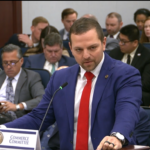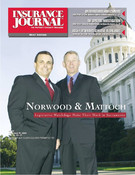Lobbying has been around for as long as any single profession has been around, but it has changed. It isn’t what it used to be,” said John Norwood, managing partner of Norwood & Mattoch, one of Sacramento’s most powerful lobbying firms. As the top lobbyist for IBA West, Norwood has been advocating on behalf of insurance agents and brokers for years, influencing policymaking in Sacramento and giving a voice to the industry. Over the years, Norwood has watched the practice of lobbying evolve … and these days, Norwood and partner Michael Mattoch are on the cusp of leading California’s lobbying industry with an ethical, fresh approach to lobbying.
“We have contribution limits today, we have entertainment limits. It’s not like everyone’s going out for dinner and drinks and things like that afterwards, it’s a different lobbying environment in Sacramento and we really try to approach it that way. We’ve really attempted to build a firm that’s based on information, and based on ethics.”
Norwood has long been known as one of California’s leading lobbyists for the insurance industry. Playing on both sides of the table, Norwood has garnered the respect of his peers, the insurance industry, businesses, politicians and regulators. With over 25 years experience, today Norwood is still going strong, and continuing to build upon one of Sacramento’s most powerful lobbying firms.
With several new additions to Norwood’s lobbyist team, the firm is more prominent than ever. In March 2004, Norwood welcomed Mattoch and Peter Conlin to the firm. Mattoch, a longtime industry veteran, came on board as partner and Norwood’s firm, previously know as Norwood & Associates, became know as Norwood & Mattoch. Conlin joined as a lobbyist. And the traditional aspects of lobbying were reinvented in order to revitalize one of politic’s oldest practices. Norwood &
Mattoch take a fresh approach to lobbying by maintaining honesty and integrity while representing the best interests of their clients.
Representing the industry
What sets Norwood & Mattoch apart from other lobbying firms is its uniquely developed specialized niche. While most lobbying firms take up interests on behalf of parties in several different areas, Norwood & Mattoch has concentrated on growing the firm by focusing on representing the needs of the insurance industry and related financial sectors, on behalf of companies and trade associations.
Norwood & Mattoch represent several dozen clients before the California Legislature and regulatory agencies, including Insurance Brokers and Agents of the West Inc., The First American Corporation, Liberty Mutual Group, Nationwide Insurance Enterprise and Pacific Life Insurance Company.
Members of the California Bar, Norwood, Mattoch and Conlin each bring several years of lobbying experience to the table, combining different aptitudes to present a strong front on behalf of each client. The lobbying team is joined by Norwood’s daughter, Erin, as a legislative assistant, to round out the firm.
“I think we’ve put together something very special here,” Mattoch said. “What we have really built here is a firm that’s representing insurance interests.” Nearly every client the firm worked with in the previous legislative session was linked to insurance–whether it is workers’ comp, property/casualty, reinsurance, and so on. Norwood & Mattoch also works with a fair number of law firms that represent insurance companies and agents.
With over 6,000 new proposed laws during each legislative session–laws that could have a significant impact on the business community and the California economy–Norwood & Mattoch are there to represent clients as a strategic ally.
Norwood & Mattoch pride themselves on having access and the opportunity to educate Senators, Assembly members, and their staff who regard Norwood & Mattoch as the authoritative voice for the insurance industry. They have the ability to take complex issues and present them in a clear, concise manner to persuade legislators to take the matters of the insurance industry to heart. In addition, Norwood & Mattoch keep their clients constantly informed of legislative activity that is passed along by their network of contacts on the Capitol.
The firm reaffirms its commitment to its clients and touts it experience as a long-established lobbying firm. In business since 1977, the firm was on the cutting edge of advocacy, utilizing business-like information kits and effective face-to-face briefings. The firm is committed to “Working the Gate,” a term that implies that Norwood, Mattoch, and their staff are committed to being outside the door to the chambers for both the Senate and the Assembly, ready to put their persuasive skills to the test.
In addition to legislative advocacy, Norwood & Mattoch also provide administrative and regulatory representation, political action and grassroots campaigns.
Changes in term limits
The new limits present many challenges to Norwood & Mattoch, whose ability to transcend both Republican and Democratic Party lines under a term-limited environment is crucial to their success. “We’re educators in the Capitol and in the regulatory arena representing our client in both places,” Mattoch said. He added that Norwood & Mattoch strives to take a multi-faceted approach to representing each client, a necessary process in California’s oft complicated insurance marketplace.
The term limits see changes in the faces of Senators and Assembly members every two years–changes that could sway the fate of proposed legislation. Norwood & Mattoch continually stay abreast of the turnover in legislation, and have the ability to quickly create a fact-based campaign to educate legislators on behalf of clients.
“Insurance affects everybody’s life whether it be personal lines or business issues. When issues come up, they’re prominent. They have a tendency to be a reaction to events that occur,” Mattoch said. He referenced the passage of Proposition 103, an initiative brought upon by consumers’ distrust of the industry and skyrocketing insurance premiums.
One of the main byproducts of Prop. 103 was the change from an appointed insurance commissioner to an elected commissioner. “Ever since that period of time,” he explained, “both the insurance commissioner and the Legislature have begun to politicize the insurance industry. [In addition,] you have a financial market that is becoming highly politicized.”
The past five years, he said, have been dominated by the workers’ compensation issue, far before Governor Arnold Schwarzenegger made reform a priority. “This was a cornerstone of politics in California. I make that point to underscore how the insurance industry is driving the political agenda. That goes from the results on homeowners insurance from fires in Southern California or what happened during the Loma Prieta or the Northridge earthquake that gave rise to the need for the California Earthquake authority, to the crisis we had drawn on by workers’ compensation that threatened to take down the California Insurance Guarantee Fund (CIGA). We’ve had a complete messing of politics and media that has affected the daily lives of 36 million Californians, made national news and has led both to the recall and the rise of a new governor.”
“One of our jobs is to make sure that the Legislature, the insurance commissioner and the media understand the unintended consequences of what might happen for their political actions,” Norwood said.
“That’s where we have to educate the Legislature, the media and the administration and the executive branch and let them know that workers’ comp is a very interrelated and complex issue, therefore doing something in one area would have an unintended consequence elsewhere,” he said. “That’s our job, whether it’s community reinvestment being proposed, explaining why the insurance industry is different from the banking industry and the fact that the insurance industry in California probably invests three-quarters of a trillion dollars in California bonds for roads, schools and buildings and has a huge employment base. If you move something around in one area, that might affect what the insurance industry is able to invest in infrastructure in California.”
The legislative process
Legislative sessions in California run every two years. Each session begins with a certain number of bills presented by Senators and Assembly members–bills initiated by personal interested and life experiences, or situations their constituents have brought to their attention, or issues brought upon by lobbyists, Norwood explained.
Some bills are proactive legislative proposals, although Norwood said that a great number of bills appear throughout the session in reaction to a current situation.
Legislation is passed on a yearly basis, and if a bill fails to meet certain deadlines throughout the year, it can still be considered the following year. The Legislature begins to appoint its leadership every December, at which point members are free to start introducing bills.
“Generally what happens is all bills introduced in the Legislature have to be submitted to a legislative council,” Norwood added. “Even if as a lawyer, I write a bill for a legislator, it still has to be submitted into a legislative council [who review the bills] and often offer advice on them, at least on the legal content.”
The deadline for submitting bills to legislative council is the third week of January, Norwood explained, and to introduce bills to the Legislature, the deadline is the third week in February.
From thereon, bills are required to be in print 30 days before a hearing or an amendment, giving the public the opportunity to know the bill exists. The hearing process begins in late March, and the deadline to move the bill out of the first committee–and house–is June 30. The bill then enters the next committee in the second house.
Inside the committees
“What happens from our standpoint is we start seeing these bills get entered towards the end of January and February, and we monitor all those introductions, pull bills that we think affect our clients, and then make sure that our clients get to see them,” Norwood said. “Many of the times these issues are repetitive issues of things in the past and we already have an expertise on, so we will go visit with the legislator and his staff and find out what their motivation for the bill is, talk about the issue and talk about our side of the issue, etc.”
Many times negotiation is the key to developing an amicable solution with legislators. If the bill ultimately ends up in the committee, as it usually does, Norwood & Mattoch step in to be sure that their client’s side is heard. “Our job is really to go to the chief consultant who’s going to have to write an analysis on that bill and essentially brief that consultant based on our knowledge of the issue, how it will affect our clients, how it will affect policyholders, or how it will affect the business of the insurance agency or company,” Norwood said.
The briefing is done both verbally and through written material–the Legislature is usually presented with a two- to five-page legal brief outlining the client’s position. In addition, the lobbyists will recruit other industries to support or oppose a bill alongside the insurance industry–industries whose business practices may also be affected by said bill. After that, Norwood & Mattoch move their advocacy straight to the Committee–talking with the chairperson, vice-chairperson, and other committee members.
Finally, the bill reaches a hearing. “In the hearing, you’re really repainting the process,” Norwood said. “But you’re doing it via witnesses; testifying in committee. Often times we bring in experts, whether it be our client or a third party expert, to really make a presentation. This is like appearing before an appellate court. That’s how we try to treat it. Very informative, very factual based, with some real expertise.”
“Insurance is now reaching over into other committees,” Mattoch added. “The privacy issue that came up was in both the banking committee and the insurance committee. The committee drives the policy in both houses. They can originate in the Senate or the Assembly. They must be considered in both policy committee and fiscal committee.”
“Nobody rests here,” Mattoch continued. “What happens out in California sends shockwaves through the rest of the country. What happens out here moves East, and that’s why it’s important that nationally and internationally people do pay attention to what happens in Sacramento–as not only the legislative process but the initiative process and the regulatory process all have an impact.”
The legislative forecast
Looking ahead, Norwood & Mattoch see many changes on the horizon. Workers’ comp will continue to be an issue, with SB 899 a target for criticism by parties who disagree with the bill’s effectiveness.
Community investment will become a priority for the Insurance Commissioner, who has said that he wants to have some mandatory community investment legislation, according to Mattoch.
Homeowners will make yet again another appearance. “We were very successful as the insurance industry in general in getting things watered down substantially, or more focused,” Norwood said. “A couple of the bills last year would have instituted Prop. 103-type limitations on your ability to cancel a homeowners insurance contract, which we think would have adversely affected the marketplace here and the price people pay for homeowners insurance.
“The other issue coming out of the Southland fires is the issue of underinsurance and how properties are valued,” he continued. “Homeowners certainly have a duty to let their insurance companies and agents and brokers know what they’ve done to their homes. The other side of the issue is that a policy of insurance should certainly be adequate for a single loss, but things get much more complicated when you’re dealing with disaster where you lose hundreds or thousands of homes, resulting in a doubling or tripling of the cost of materials and labor. It’s really a problem.”
Also on the agenda? Auto insurance, med-mal, credit scoring, and tort reform.
“I know it seems around the corner, but it’s amazing what you think is going to come up in a session and what actually does,” Norwood said.
As we head into the 2005 legislative session, Norwood & Mattoch will continue to serve as the industry’s leading watchdog on legislation that affects agents & brokers.
Topics California Agencies Legislation Workers' Compensation Homeowners Market
Was this article valuable?
Here are more articles you may enjoy.


 ‘Meaningful Decline’ in Industry Q1 Underwriting Profit Expected From Winter Storms
‘Meaningful Decline’ in Industry Q1 Underwriting Profit Expected From Winter Storms  Florida OIR Slams Committee-Approved Clearinghouse Bill Changes as ‘Illusory’
Florida OIR Slams Committee-Approved Clearinghouse Bill Changes as ‘Illusory’  Sompo Holdings Completes Acquisition of Aspen, Taking it Private
Sompo Holdings Completes Acquisition of Aspen, Taking it Private  Resilience: Cyber Risk Shifts From Disruption to Long-Tail Losses
Resilience: Cyber Risk Shifts From Disruption to Long-Tail Losses 


